No one expects Hongkongers to turn up in their tens of thousands for June 4 vigil but supporters hope there will be at least some show of solidarity.
The resolve of pro-democracy Hongkongers faces a milestone test on Friday, as police enforce a ban on the June 4 Tiananmen anniversary vigil at Victoria Park and deploy thousands of officers across the city to prevent any defiant gatherings.
Although no one is expecting candle-bearing Hongkongers to show up in their tens of thousands like in years past, supporters of the movement hope there will be at least some show of solidarity even as organisers have urged people not to gather at the park and even called off an online memorial for fear of flouting the law.
They have advised supporters to light candles and remember the event in their own individual ways instead.
For the second year running, Hong Kong authorities have banned the vigil, citing public health concerns arising from the Covid-19 pandemic.
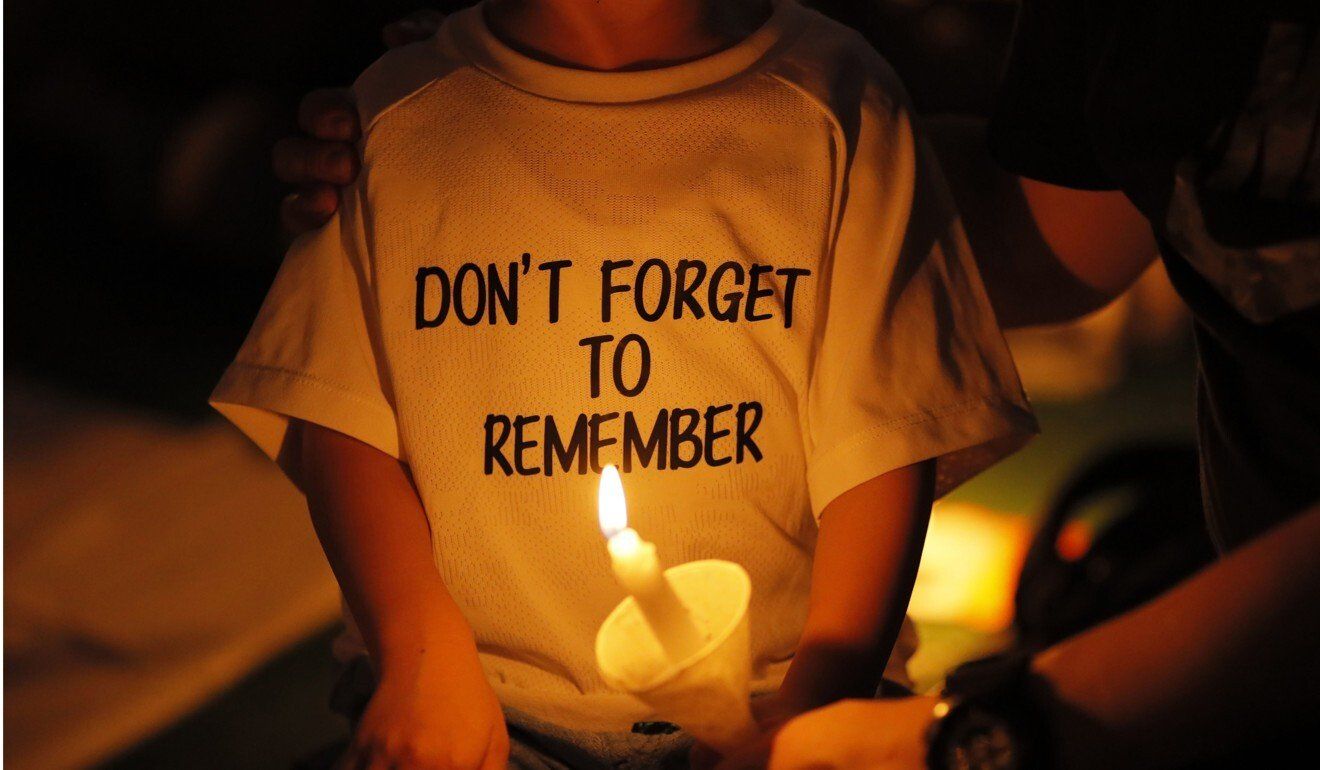 The candlelight vigil in Victoria Park in 2019.
The candlelight vigil in Victoria Park in 2019.
Last year, thousands turned up anyway and while police took a tolerant approach to the unauthorised gatherings around the park, 26 activists were later arrested for illegal assembly.
For three decades, Hongkongers had gathered at Victoria Park, held lit candles, chanted and remembered the day in 1989 when military tanks rolled into Beijing’s Tiananmen Square and crushed weeks of student-led protests calling for more democracy and an end to corruption.
Hong Kong is the only part of China that faithfully has held large gatherings to mark the anniversary, mourning the hundreds, perhaps many more, who died.
But this year’s anniversary, the first since Beijing imposed a sweeping national security law on the city, has raised new concerns for organisers as well as those planning to show up at the park or in other places, or even to mark the day in small groups.
The vigil is becoming a test case of the limits of protest in the national security law era, in particular the fate of a potentially offending slogan that organisers and participants have chanted every year, calling for an “end to one-party dictatorship” in China.
While this had irritated the pro-Beijing camp in the past as it went against Article 1 of the Chinese constitution which says China is a “socialist state under the people’s democratic dictatorship”, Hong Kong had lacked a law to make shouting the slogan a crime, legal experts said.
But this could change soon, a source familiar with government thinking on the issue told the Post. “The ambiguity of the past will not last much longer with the national security law,” he said.
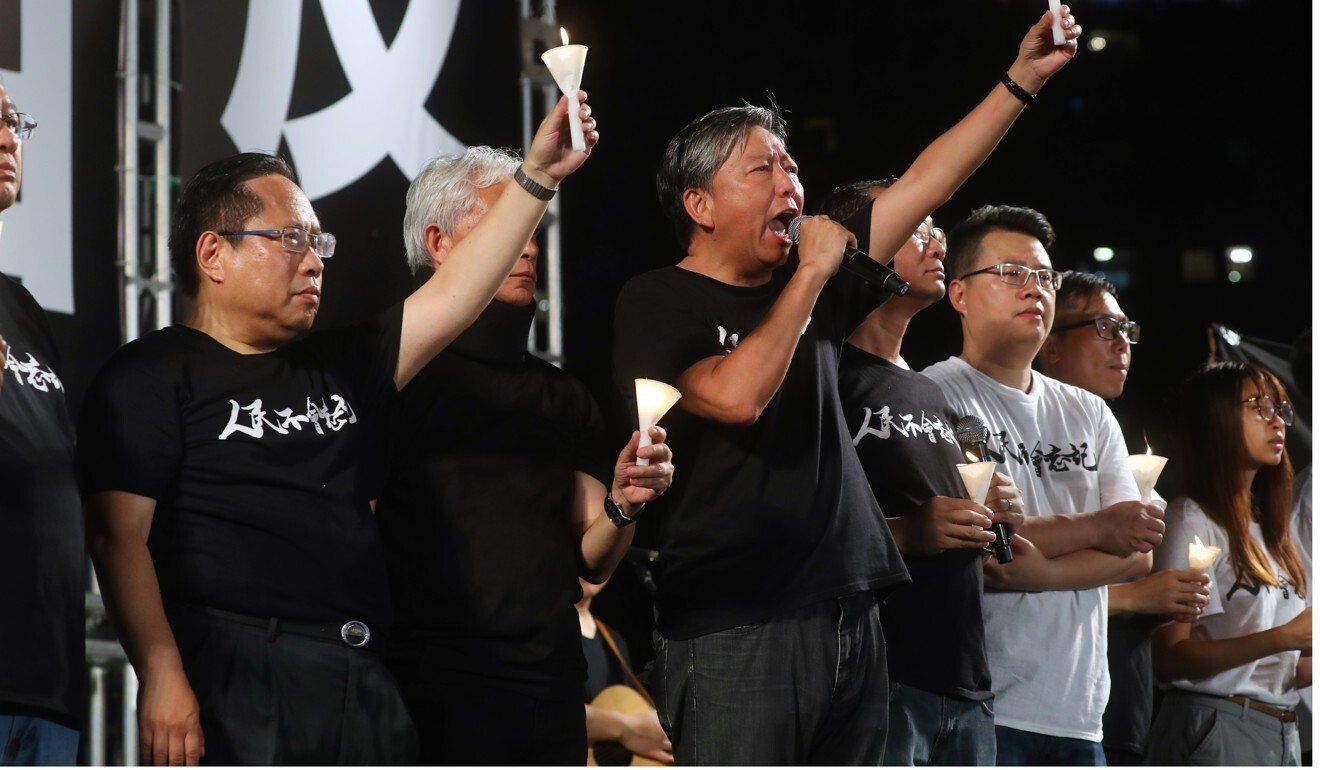 Alliance leaders on stage at the 2019 vigil in Victoria Park.
Alliance leaders on stage at the 2019 vigil in Victoria Park.
Police, which had said initially they would mobilise more than 3,000 anti-riot officers, on Thursday strengthened manpower plans to 7,000, and pledged to carry out “high-profile patrols to dissuade groups from gathering”, according to an insider.
The decision to strengthen their presence and close off the park’s football pitches and lawns from Friday evening came as calls for people to show up in force appeared to gather momentum online.
Meanwhile, all seven Catholic churches planning to hold their annual mass today for the victims of the crackdown found banners condemning them plastered outside their premises on Thursday.
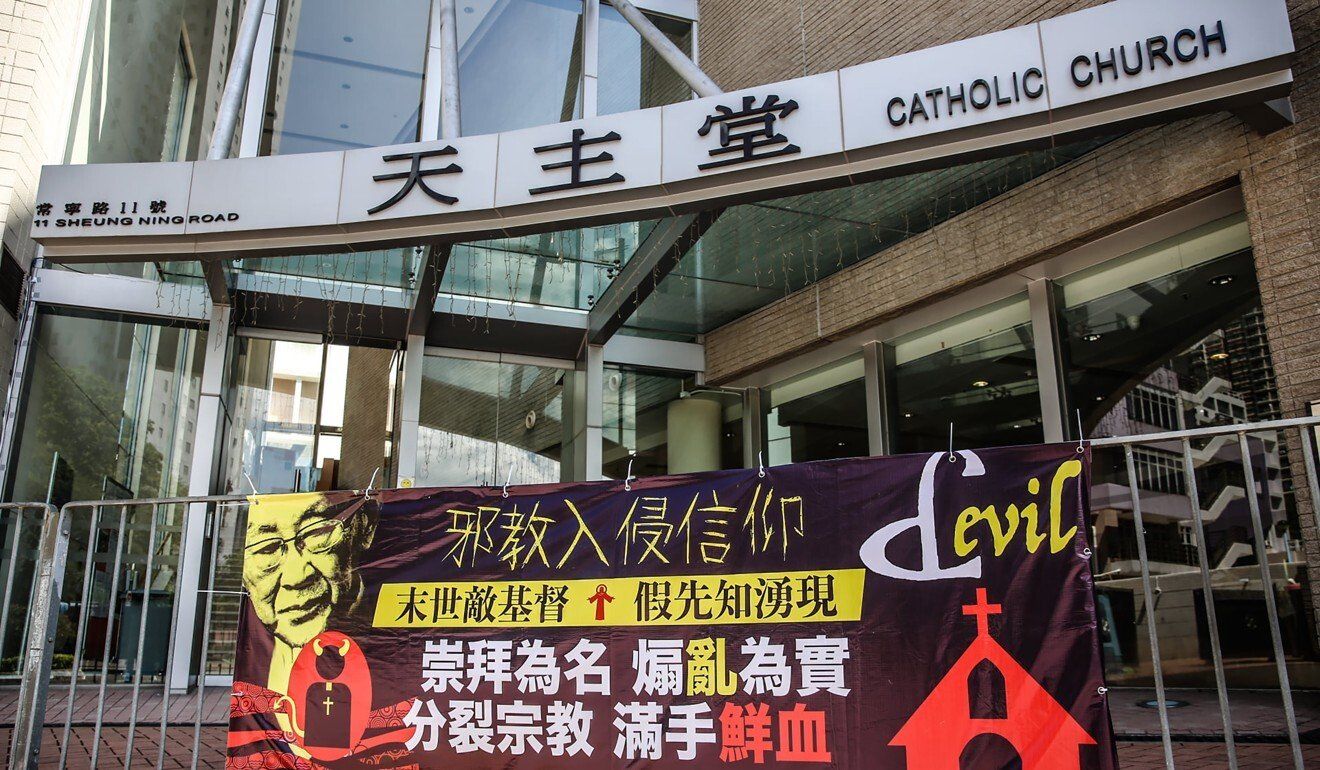 Banners were left hanging outside seven Catholic churches.
Banners were left hanging outside seven Catholic churches.
They were inviting chaos and siding with the devil, one of the banners outside the Holy Cross Church in Sai Wan Ho read.
The organiser, the Justice and Peace Commission of the Hong Kong Catholic Diocese, shrugged off the campaign and said it would press ahead with the mass. It expected around 2,000 participants to show up in churches across the city.
While the organiser of the Victoria Park vigil, the Hong Kong Alliance in Support of Patriotic Democratic Movements of China, has cancelled all events and temporarily closed its June 4 museum in Mong Kok, members indicated they planned to light candles individually in different parts of the city.
“Of course, we feel extremely upset, and also very angry at not being able to be in the park,” alliance secretary Richard Tsoi Yiu-cheong told the Post. “The authorities are using public health as an excuse when everyone knows the decision to ban the vigil was a political one, especially since it’s the centenary of the Communist Party this year and everything has become so sensitive.”
He advised the public to weigh the legal risks when deciding on their actions.
Liberal and conservative legal scholars who spoke to the Post agreed that chanting the slogan demanding the “end to one-party dictatorship” at any organised public event was likely to be regarded as an act of subversion.
Executive councillor and barrister Ronny Tong Ka-wah said it might not be illegal if a single person wore black or chanted slogans, but it could be deemed a violation of the national security law if a group made plans to do so together, as illegal assemblies would be tantamount to using “illegal means” to incite subversion, a crime as described under Article 22 of the law.
“The public can mourn the June 4 incident but do not have to show up at Victoria Park together, wear black or chant slogans. People should respect the law and the constitutional order,” Tong said.
Professor Simon Young Ngai-man, associate dean of the University of Hong Kong’s faculty of law and a criminal law specialist, said holding a candle was evidence of commemoration, not subversion, but calling for “a fundamental change in the government of the People’s Republic of China and its governance” came closer to subverting state power.
Young was of the view that merely attending a vigil should be legal if there were no public health grounds to make it illegal or trigger the subversion offence.
“Honouring or commemorating those who have died by candlelight is not prohibited by the national security law, according to my understanding,” he said.
A more serious issue for the alliance is whether it may find itself outlawed in future. The potentially offending slogan is also in its mission statement of “five goals”. The others are its call for the release of dissidents in mainland China, vindication of the 1989 pro-democracy movement, accountability for the Tiananmen Square crackdown and building a democratic country.
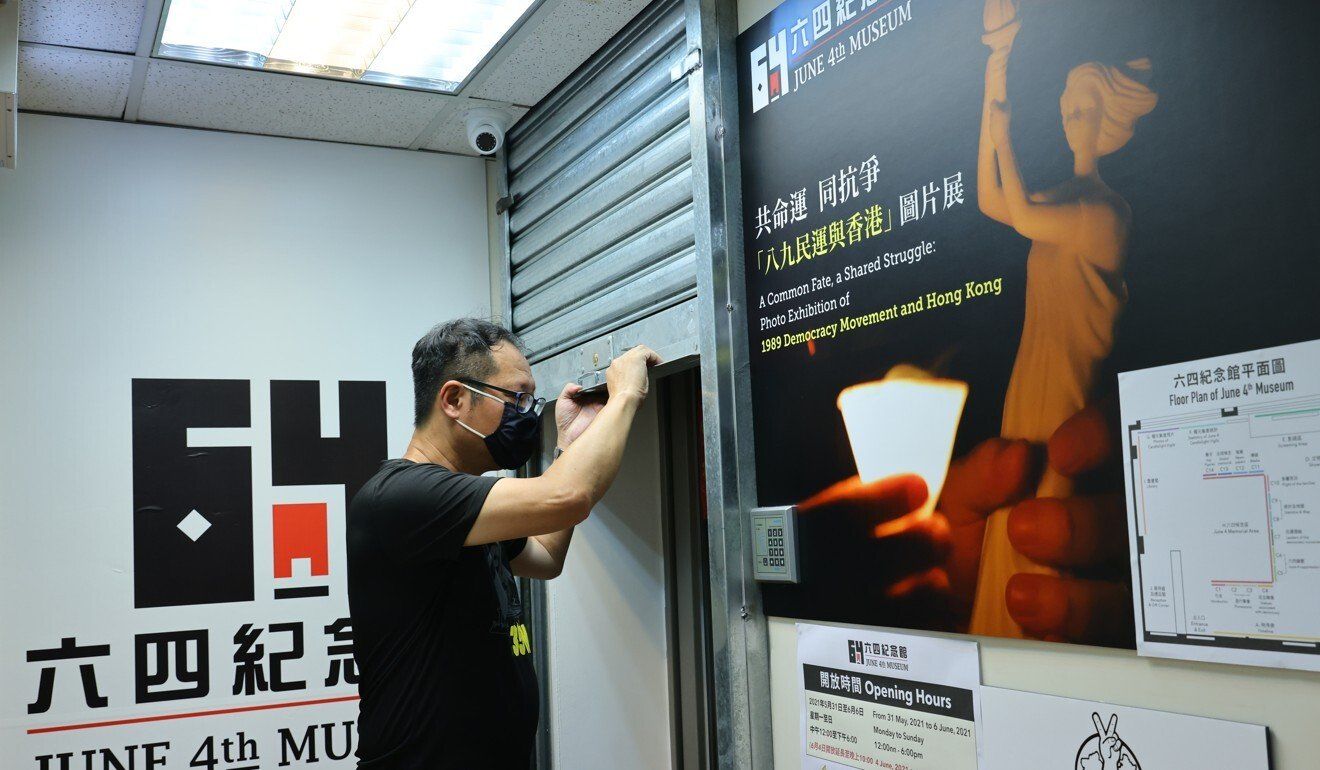 Richard Tsoi pulls down the shutters on the June 4 museum.
Richard Tsoi pulls down the shutters on the June 4 museum.
The main question now is whether some or all of those goals flout the national security law which bans acts of subversion, secession, terrorism and collusion with foreign forces.
The pro-establishment camp has already insisted that the alliance’s stated goals contravened the national security law.
Tian Feilong, an associate professor of law at Beijing’s Beihang University, pointed to the amendment of China’s national constitution in 2018, which left no doubt about the supremacy of the Communist Party.
The amendment specifies that “leadership by the Communist Party of China is the defining feature of socialism with Chinese characteristics”, and forbids organisations or individuals from damaging the socialist system.
Tian said the alliance had “overstepped boundaries” and endangered national security by including “an end to one-party dictatorship” in its manifesto, and by shouting the slogan during its gatherings, it had already taken “actions” to incite hatred of the Communist Party.
“What was allowed in the past cannot be an excuse for what is wrong today,” he told the Post. “The manifesto has to be amended or removed under the new legal requirement, or the organisation has to bear responsibility for infringing the security law.”
Tian, who is director of the Chinese Association of Hong Kong and Macau Studies, a semi-official think tank, urged the Security Bureau to act, either by demanding that the alliance remove its “subversive” goals, or outlawing the group outright if it refused to comply.
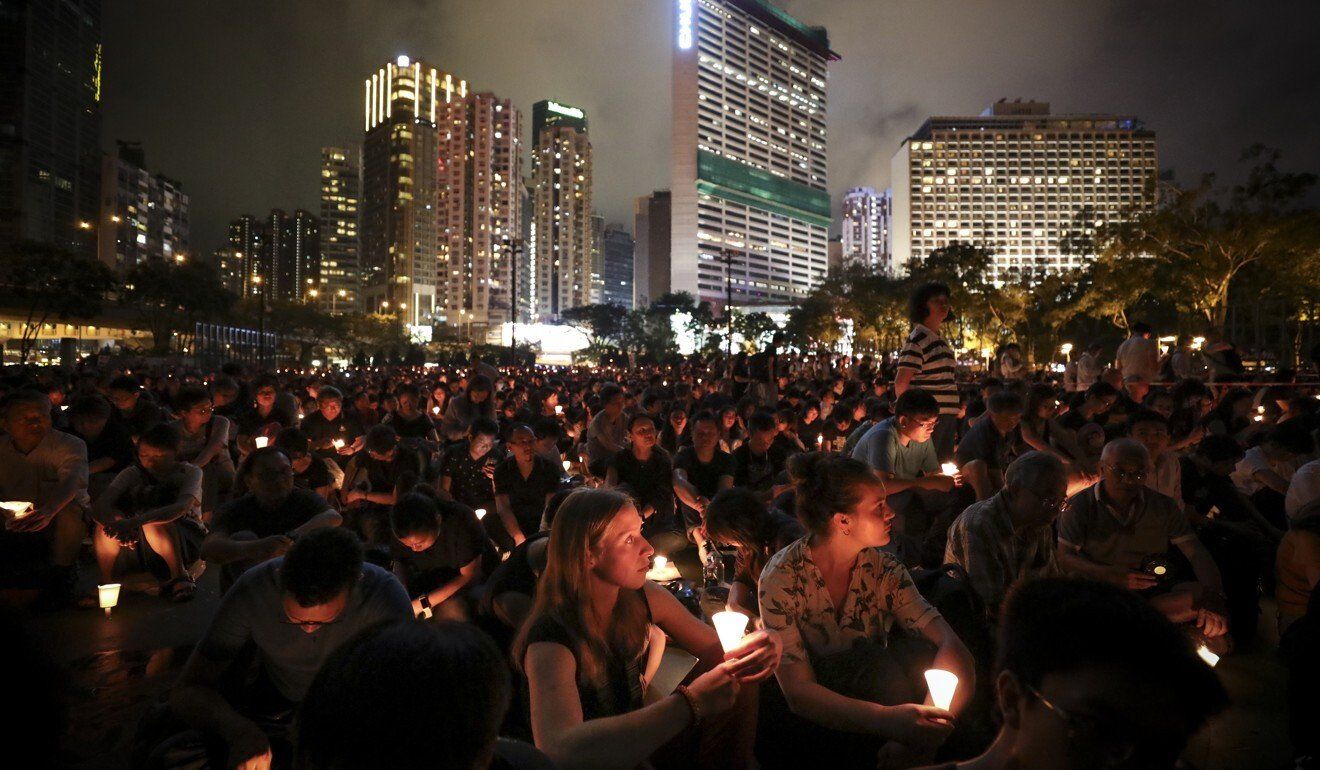 Hong Kong is the only part of China that faithfully has held large gatherings to mark the anniversary.
Hong Kong is the only part of China that faithfully has held large gatherings to mark the anniversary.
Pro-establishment lawmaker Priscilla Leung Mei-fun, a member of the Basic Law Committee, said the crux of the matter was not whether Hongkongers should be allowed to commemorate the June 4 incident.
“It is whether the alliance should look into the problem with its manifesto,” she said.
On Tuesday, Chief Executive Carrie Lam Cheng Yuet-ngor said that although the Basic Law, the city’s mini-constitution, guaranteed Hong Kong a high degree of autonomy, the city remained directly accountable to the central government, and apart from the national security law, Hongkongers had to be mindful of relevant provisions of the Chinese constitution.
A leading legal scholar in Hong Kong who spoke to the Post on condition of anonymity said the amendment to the national constitution showed the dominance of the Communist Party, and any call to end its rule risked violating Section 1 of Article 22 of the national security law, which forbids overthrowing or undermining the basic system of the central government.
The scholar doubted police would allow future vigils organised by the alliance, and anyone contravening such a ban, even in groups of just three, could be deemed as being part of an unlawful assembly.
The alliance’s Tsoi said the group’s leadership had not yet discussed its future, and for now would continue upholding its beliefs and five goals, including the call to “end one-party dictatorship”.
“We have been very careful with our actions,” he said. “We try to do everything we can to comply with the law, but we cannot just give up our beliefs simply because of these outside threats or comments.”
So far, he added, the authorities had not told the alliance its goals were a problem.
“It’s hard to talk about the alliance’s future,” he said. “All we know is that we have to retain our strength, and we believe people who have the same beliefs will stand by us.”
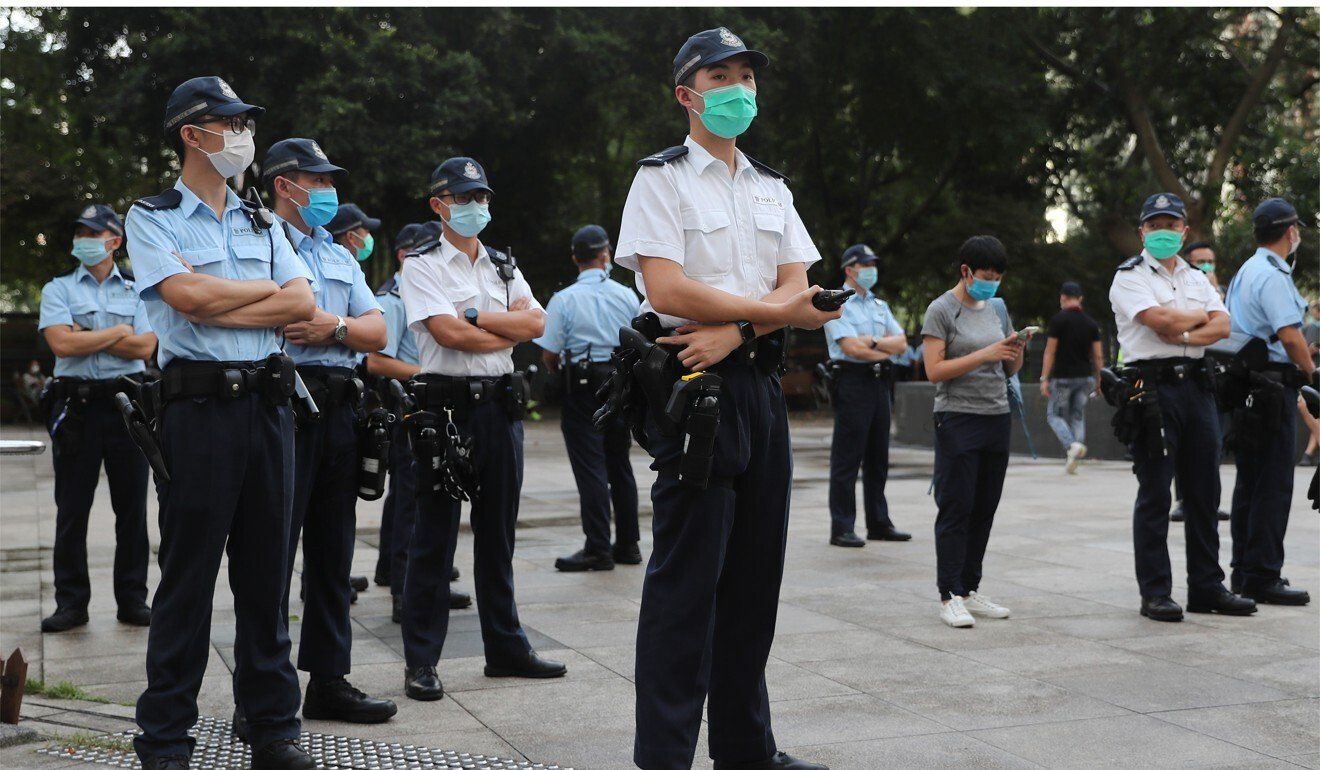 Police officers took a hands-off approach last year although a number of activists were later arrested.
Police officers took a hands-off approach last year although a number of activists were later arrested.
Veteran democrat and alliance vice-chairman Albert Ho Chun-yan, who is in jail for taking part in an illegal protest in 2019, also released a video message saying he would continue to mourn the victims of June 4 while behind bars.
“We will not give up and we will continue to have hope for Hong Kong, our nation and our country,” he said in the video uploaded online by the alliance on Thursday.
“The environment this year is extremely harsh, and it is understandable that many of us may consider not to make unnecessary sacrifices. The most important thing is that everyone’s hearts are still together. We will persevere through the long and hard days into the future.”















